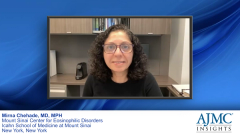
EoE Management: Timely Diagnosis and Multifaceted Treatment Goals
Mirna Chehade, MD, MPH, outlines consequences that can stem from delay in diagnosis of eosinophilic esophagitis (EoE), as well as treatment goals, highlighting unique considerations for treatment in children.
Episodes in this series

This is a video synopsis/summary of an Insights involving Mirna Chehade, MD, MPH.
Chehade addresses the consequences of delayed eosinophilic esophagitis (EoE) diagnosis, emphasizing potential complications. These include persistent symptoms, higher risk of severe esophageal food impaction requiring urgent intervention, remodeling of the esophagus leading to stiffness, narrowing, or structure formation, and an increasing burden on patients and their families, both physically and psychosocially.
In response to treatment goals for EoE in pediatric and older patients, Chehade outlines several objectives. These include inducing and maintaining disease remission, preventing or reversing complications like failure to thrive (reversible with successful treatment), and minimizing adverse effects. For pediatric patients, the focus is on social and psychological aspects, taking into consideration the impact of feeding difficulties and highly restrictive diets on their quality of life. Chehade emphasizes the importance of involving dietitians and feeding therapists, monitoring long-term adverse effects of pharmacological therapies, and finding a balance between efficacy and quality of life in treatment approaches. This comprehensive overview highlights the multifaceted goals of EoE management across different age groups.
Video synopsis is AI-generated and reviewed by AJMC® editorial staff.
Newsletter
Stay ahead of policy, cost, and value—subscribe to AJMC for expert insights at the intersection of clinical care and health economics.








